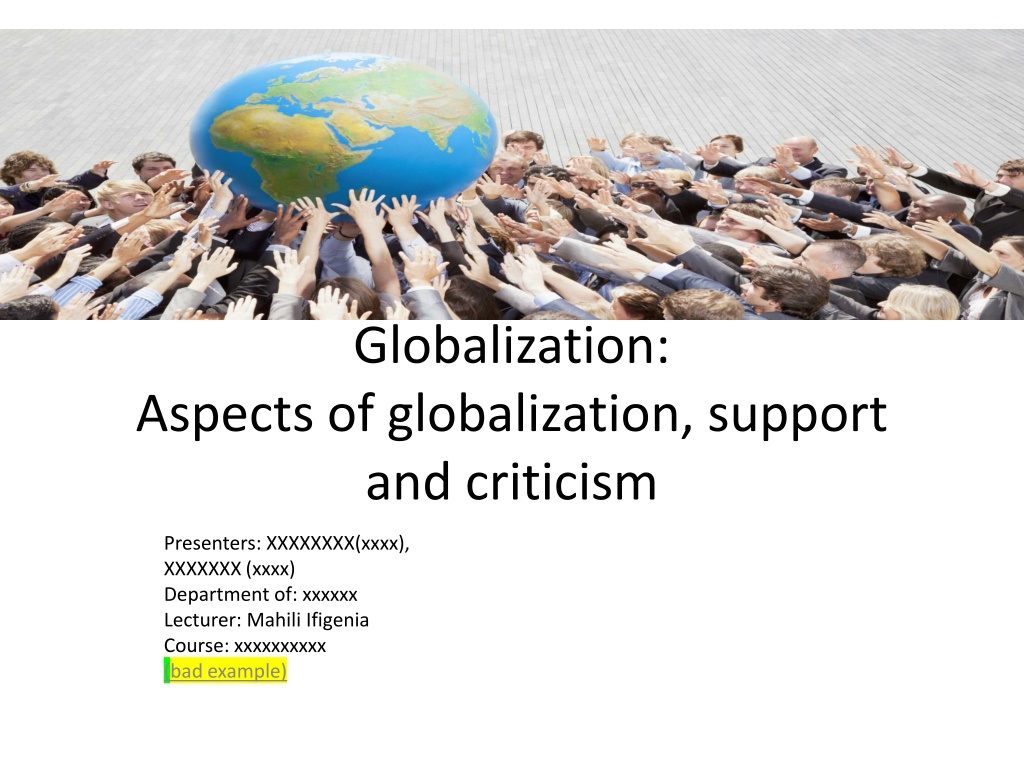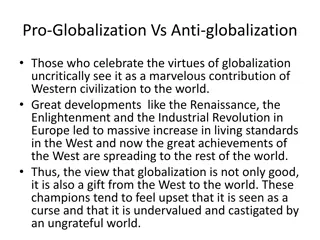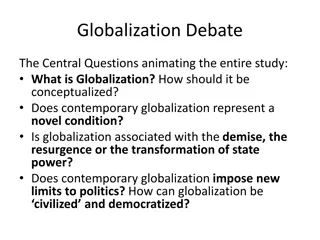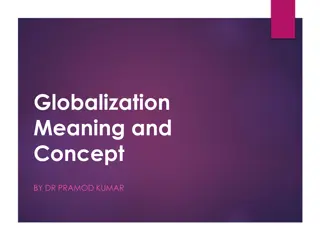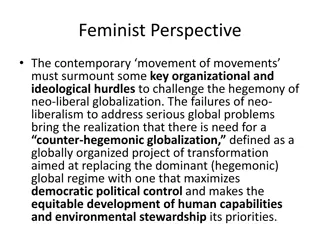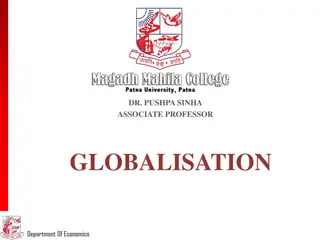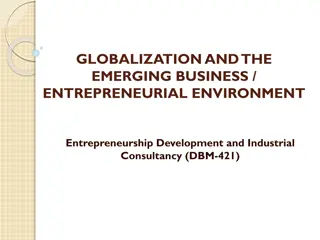Understanding Globalization: Aspects, Support, and Criticism
Globalization encompasses various aspects such as international integration, advances in transportation and telecommunications, interdependence of cultural and economic activities. The term has been widely used since the mid-1980s, leading to both support and criticism. While economic globalization has brought unprecedented mobility of goods and capital, it has also resulted in unequal power relations and economic disparities between rich and poor countries. This discussion explores the definitions, implications, and debates surrounding globalization.
Download Presentation

Please find below an Image/Link to download the presentation.
The content on the website is provided AS IS for your information and personal use only. It may not be sold, licensed, or shared on other websites without obtaining consent from the author. Download presentation by click this link. If you encounter any issues during the download, it is possible that the publisher has removed the file from their server.
E N D
Presentation Transcript
Globalization: Aspects of globalization, support and criticism Presenters: XXXXXXXX(xxxx), XXXXXXX (xxxx) Department of: xxxxxx Lecturer: Mahili Ifigenia Course: xxxxxxxxxx (bad example)
Globalization: Aspects, support & criticism XXXXXXXX(xxxx), XXXXXXX (xxxx) Department of: xxxxxx Instructor: Machili Ifigeneia 4thsemester English: Oral presentations (good example)
Definition of globalization The process of international integration. Advances in transportation and telecommunications infrastructure the major factors of globalization. Further interdependence cultural activities. The term globalization has been increasingly used since the mid-1980s and especially since the mid-1990s. Bad example of economic and
Globalization: definition or What is globalization? The process of international integration Advances in transportation and telecommunications infrastructure Interdependence of economic and cultural activities Term use since 1980s/1990s (good example)
Globalization of the economy (bad example) Advances in communication and transportation technology, combined with free-market ideology, have given goods, services, and capital unprecedented mobility. Western countries want to open world markets supported by Southern elites and use international financial institutions to reduce tariffs, privatize state enterprises. Profits for investors but offered pittances to laborers. Capitalist economic theory holds that a completely liberalized global market is the most efficient way to foster growth. Rich countries and large corporations dominate the global marketplace and create very unequal relations of power and as a result, trade is inherently unequal and poor countries seldom experience rising unemployment, poverty, and income inequality. well-being but increasing
Economic globalization (good example) Unprecedented mobility of goods, services, and capital Use of international financial institutions to reduce tariffs & privatize state enterprises Entailed profits for investors but pittances to laborers Liberalized global market as the most efficient way to foster growth (Capitalist economic theory) Unequal relations of power & inherently unequal trade between the rich and the poor
Cultural globalization (bad example) Refers to the transmission of ideas, meanings and values around the world in such a way as to extend and intensify social relations and is marked by the common consumption of cultures that have been diffused by the Internet, popular culture media, and international travel. Formation of shared norms and knowledge and brings increasing interconnectedness among different populations and cultures. The diffusion of certain cuisines such as American fast food chains is a visible aspect of cultural globalization. McDonald's and Starbucks with over 32,000 and 18,000 locations operating worldwide. Music has an important role in economic and cultural development during globalization. Jazz and reggae began locally and later became international phenomena. Some critics of globalization argue that it harms the diversity of cultures.
Cultural globalization Transmission of ideas, meanings and values to extend and intensify social relations by the Internet, popular culture media etc. Formation of shared norms and knowledge and increasing interconnectedness among different populations and cultures. Ex: Spread of certain cuisines e. g. American fast food chains Ex: Spread of music e. g. Jazz & reggae (good example)
Multilingualism and the emergence of lingua francas (bad example) Most people in the world are multilingual. Multilingualism is becoming a social phenomenon governed by the needs of globalization and cultural openness. A lingua franca is a language systematically used to make communication possible between people not sharing a mother tongue. Today, the most popular second language is English. Some 3.5 billion people have some acquaintance of the language. 35% of the world's mail and 40% of the world's radio programs are in English . Speakers of regional and minority languages are increasingly unable to compete with those who speak dominant languages. The current number is between 6000 and 7000 languages spoken and between 50 90% of those will have become extinct by the year 2100.
Multilingualism and the emergence of lingua francas Multiplicity of multilingual people. Multilingualism as an effect of the needs of globalization and cultural openness. Lingua franca: a language systematically used to make communication possible between people not sharing a mother tongue. English as the most popular second language 35% world's mail 40% of the world's radio programs Speakers of regional and minority languages unable to compete with those who speak dominant languages. 6.000 and 7.000 languages spoken 50 90% of languages will have become extinct by 2100. (good example)
Internet (bad example) Both a product of globalization as well as a catalyst, the Internet connects computer users around the world. From 2000 to 2009, the number of Internet users globally rose from 394 million to 1.858 billion. According to research firm IDC (International Data Corporation), the size commerce , will equate to US $16 trillion in 2013. A report by Oxford Economics estimates the total size of the digital economy at $20.4 trillion, equivalent to roughly 13.8% of global sales. of total worldwide e-
The Internet Internet users 2000 2009 394 million 1858 billion Total worldwide e-commerce US$16 trillion in 2013 (IDC, 2015) Total size of digital economy $20.4 trillion = 13.8% of global sales (Oxford Economics Report, 2014) (good example)
International tourism (bad example) Globalization has made tourism a popular global leisure activity. The World Tourism Organization defines tourists as people "traveling to and staying in places outside their usual environment for not more than one consecutive year for leisure, business and other purposes . The World Health Organization (WHO) estimates that up to 500,000 people are in flight at any one time.
International tourism Tourism as a popular global leisure activity. Tourists are people traveling to and staying in places outside their usual environment for not more than one consecutive year for leisure, business and other purposes (The World Tourism Organization, 2010, p. 23). 500,000 people in flight (WHO, 2011) (good example)
International sports (bad example) Modern international sports events can be big business for as well as influencing the political, economical, and other countries around the world. The ancient Olympic Games were a series of competitions held between representatives of several city-states and kingdoms from Ancient Greece. During the 19th century, the Olympic Games became a popular global event. cultural aspects of
Support (bad example) Supporters of globalization argue that the benefits of a more interdependentent global economy outweigh the drawbacks. Economies that are developing globally have more economic growth than demonstrating globalization's benefits for developing regions. Globalization can help democratic political systems. Foreign exchange allows more products and services to be available, while also lowering costs, because of specialization. established economies, create capitalistic and
In support of globalization More important benefits than drawbacks. More economic growth in economies developing globally than in established economies Creation of capitalistic and democratic political systems. Availability & lower cost of more products & services due to foreign exchange (good example)
Criticism (bad example) Globalization causes unemployment in industrialized countries because firms move their factories to places where they can get cheaper workers. Globalization may lead to more environmental problems. A company may want to build factories in other countries because environmental laws are not as strict as they are at home. Poor countries in the Third World may have to cut down more trees so that they can sell wood to richer countries. Globalization can lead to financial problems . In the 1970s and 80s countries like Mexico, Thailand, Indonesia or Brazil got a lot of money from investors who hoped they could build up new businesses there. These new companies often didn t work, so they had to close down and investors pulled out their money. Some of the poorest countries in the world, especially in Africa, may get even poorer. Their population is not as educated as in developed countries and they don t have the new technology that we do. Human, animal and plant diseases can spread more quickly through globalization.
Against globalization Unemployment in industrialized countries More environmental problems. Financial problems (e. g. Mexico, Thailand, Indonesia or Brazil) The poorer become even poorer (e. g. Africa) Spread of human, animal and plant diseases (good example)
Conclusion (bad example) Globalization is a broad, evolving, multifaceted issue that affects people and cultures around the world. a serious issue that affects many nations.
Globalization is (good example) a serious, broad, evolving, multifaceted issue affecting people, cultures 7 nations around the world.
Thank you for listening to our presentation! (bad example)
